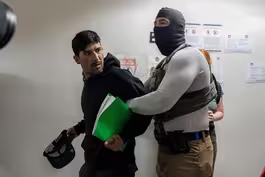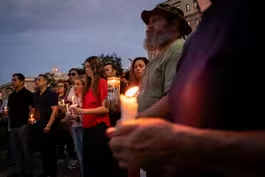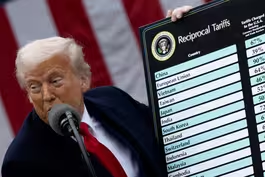
Homeless camp crackdown draws criticism from health experts
Clip: 7/8/2025 | 8m 50sVideo has Closed Captions
California's homeless encampment crackdown draws criticism from health experts
California is home to the nation’s largest homeless population. Gov. Gavin Newsom, whose administration has spent more than $20 billion on the issue, recently urged cities and counties to pass laws that effectively ban “dangerous and unhealthy” encampments. While some welcomed the move, others worry about the health impacts of such measures on the state’s homeless population. Stephanie Sy reports.
Problems playing video? | Closed Captioning Feedback
Problems playing video? | Closed Captioning Feedback
Major corporate funding for the PBS News Hour is provided by BDO, BNSF, Consumer Cellular, American Cruise Lines, and Raymond James. Funding for the PBS NewsHour Weekend is provided by...

Homeless camp crackdown draws criticism from health experts
Clip: 7/8/2025 | 8m 50sVideo has Closed Captions
California is home to the nation’s largest homeless population. Gov. Gavin Newsom, whose administration has spent more than $20 billion on the issue, recently urged cities and counties to pass laws that effectively ban “dangerous and unhealthy” encampments. While some welcomed the move, others worry about the health impacts of such measures on the state’s homeless population. Stephanie Sy reports.
Problems playing video? | Closed Captioning Feedback
How to Watch PBS News Hour
PBS News Hour is available to stream on pbs.org and the free PBS App, available on iPhone, Apple TV, Android TV, Android smartphones, Amazon Fire TV, Amazon Fire Tablet, Roku, Samsung Smart TV, and Vizio.
Providing Support for PBS.org
Learn Moreabout PBS online sponsorshipAMNA NAWAZ: California is home to the nation's largest homeless population, many of whom live in encampments, one of the most visible symptoms of the state's dual housing and homelessness crises.
Governor Gavin Newsom, whose administration has spent more than $20 billion on housing and other programs, recently urged cities and counties to pass laws that effectively ban -- quote - - "dangerous and unhealthy encampments."
While some welcomed the move, as Stephanie Sy reports, others worry about the health impacts on the state's homeless population.
STEPHANIE SY: Tucked between a freeway and a waste processing plant in Southeast Los Angeles is a community.
What may look like things discarded are people's precious belongings.
MAN: Everything's ready to go, right?
STEPHANIE SY: On a recent morning, outreach workers turn up.
Jacqui Herrera and David Mendez are moving.
The couple can only bring what they can fit into these plastic bags, plus their bikes.
They gaze out the window nervously as they're transported to their next stop.
CARTER HEWGLEY, L.A. County Homeless Initiative: The criteria is, are you here and are you experiencing homelessness and are you willing to come inside?
STEPHANIE SY: Carter Hewgley is a senior manager at L.A. County's Homeless Initiative, which runs the Pathway Home program.
CARTER HEWGLEY: You guys will be living together, your own place.
STEPHANIE SY: Today was weeks in the making.
Herrera and Mendez, along with 21 other households, are moving into temporary housing in area motels.
CARTER HEWGLEY: All of the people going into interim housing today will have on-site supportive services, intensive case management, life skills development, and mental health supports at the location they're going to.
STEPHANIE SY: After hours of filling out paperwork, learning the rules, and meeting with a case worker, they're finally shown their room.
The tension of the day seems to fall away.
What did you think when you walked into this room, this air-conditioned room of your own?
DAVID MENDEZ, Pathway Home Participant: To be honest, thankful.
STEPHANIE SY: Yes, be honest.
DAVID MENDEZ: I was extremely thankful, actually.
Like, I get to fix my life up, because this was basically what kind of stopped me, in the sense of not being able to on a daily basic shower or whatever and go look for a job or like... JACQUI HERRERA, Pathway Home Participant: Have a restroom.
DAVID MENDEZ: Yes, and all that.
STEPHANIE SY: L.A. County is banking on programs like Pathway Home to reduce the number of homeless encampments, which ballooned across the state during the COVID pandemic.
It's resisted recent calls by Governor Gavin Newsom for cities and counties to adopt ordinances that would effectively ban encampments on public property.
GOV.
GAVIN NEWSOM (D-CA): It's time to take back the sidewalks.
It's time to take these encampments and provide alternatives.
It's time, I think, to just end the excuses.
STEPHANIE SY: Newsom's announcement is part of a broader trend toward more aggressive enforcement against homeless encampments across the state.
After a U.S. Supreme Court decision last June made it legal for governments to penalize sleeping and camping in public places, cities like San Francisco, Berkeley and Oakland, some of the most liberal in the country, began to enforce and adopt measures aimed at curbing encampments.
Last November, Garden Grove, a city in Orange County, passed a ban on public camping spearheaded by councilmember George Brietigam.
Do you think you're a model for other cities?
GEORGE BRIETIGAM, Garden Grove, California, Councilmember: I know we are.
I mean, we have got the best success.
I do have fault.
If that's all cities are going to do is pass an ordinance and shoo off their problems to other cities, I think that's not a very responsible methodology.
STEPHANIE SY: Garden Grove had already successfully reduced its unhoused population of only a few hundred people by 39 percent between 2022 to 2024.
It's something Breitigam attributes to providing services such as health care and a new regional shelter that offers drug treatment and job training.
GEORGE BRIETIGAM: We have got all the carrots, and we needed that stick to progress with the harder-to-get-to homeless individuals.
STEPHANIE SY: Why did you feel like you needed the stick when you were already enjoying so much success?
GEORGE BRIETIGAM: You know, we know we're getting the easy ones now, the ones who are willing to cooperate.
You're going to have less success when you're dealing with the hard people.
And so how do you motivate people to take advantage of the programs?
How do you motivate them if there's no consequences for their negative behavior?
JESSE LUCATERO, Garden Grove, California, Police Department: We're not very heavy-handed on this ordinance at all.
STEPHANIE SY: Garden Grove Police Officer Jesse Lucatero says his unit prioritizes offering services and shelter and uses the ordinance as a last resort.
He says they have issued fewer than a dozen citations since the law came into effect last December.
JESSE LUCATERO: So, like 99.9 percent of the time, when we have someone that's in violation of this camping ordinance, we get compliance and they will willfully just move on.
STEPHANIE SY: For critics of public camping bans, forcing people to move on is more of a problem than a solution.
SHAWN PLEASANTS, Advocate For Unhoused People: It's just like the leaf blowers.
You blow the leaves to this side of the street, and they blow them right back.
That's all they're doing.
STEPHANIE SY: Before getting housing and becoming an advocate, Shawn Pleasants lived in an encampment in Los Angeles' Koreatown for 10 years.
He's been through encampment sweeps.
SHAWN PLEASANTS: Sweeps are probably some of the most devastating events that you encounter as a person living on the streets of Los Angeles.
Your journey for housing just gets pushed back again because now you're back in survival mode.
All that stuff resets, resets every single time.
STEPHANIE SY: That's a pattern Dr. Absalon Galat has seen over and over again.
Galat is head of L.A. County's street medicine and mobile clinic program, which treats 3,500 unsheltered patients a year.
DR. ABSALON GALAT, L.A. County Health Services: A lot of my patients are always moving.
And they're losing their medications, which are so important in maintaining their health, as well as their documentation that will actually help them go into housing, their I.D.s, the Social Security.
You're taking away the support that people have for one another.
STEPHANIE SY: That cycle is made worse with incarceration, which critics warn will happen more often where public camping is made illegal.
DR. SALMAAN KAMAL, UCLA National Clinician Scholar: I can sympathize with a lot of people who want to address the homelessness issue in California, but criminalizing homelessness and banning encampments is going to make the problem worse.
STEPHANIE SY: Dr. Salmaan Kamal researches the health impacts experienced when the homeless are put in jail.
DR. SALMAAN KAMAL: People with a history of incarceration typically have a hard time finding jobs, finding housing.
In the long term, these folks are going to be back out on the streets.
They're going to be in a worse situation, and they're going to be farther away from housing.
STEPHANIE SY: And farther away from medical treatment.
DR. ABSALON GALAT: The discharged people know.
STEPHANIE SY: Dr. Absalon Galat says overdose is the leading cause of death among the city's homeless population, and that programs like L.A. County's Pathway Home support recovery.
DR. ABSALON GALAT: Before, our focus was, how can I keep you alive on the street as long as possible so you don't overdose?
Our rates of success is much higher with our patients that have been in interim housing, because now they don't have to worry about, where am I going to eat today, where am I going to sleep today?
STEPHANIE SY: County officials say they are seeing promising results overall.
In the two years since Pathway Home launched, more than 1,600 people have moved into interim housing, and one in five are now in permanent homes.
Back in his motel room, David Mendez, who also struggles with the substance use disorder, is already thinking ahead.
DAVID MENDEZ: I allowed my substance abuse, whatever, to just overtake me first.
STEPHANIE SY: What do you think you're going to get from here that goes beyond having this place?
Like, what kind of services do you feel like they can connect you to?
DAVID MENDEZ: I think the biggest one that matters to me right now is stop using, in a sense, like... STEPHANIE SY: Mendez and Herrera said this could be the fresh start they need.
Was it a good day, Jacqueline?
JACQUI HERRERA: Yes, it was great.
It was like -- I do.
DAVID MENDEZ: Yes, I think it was a great day, actually.
I mean, I'm just happy.
STEPHANIE SY: Two Angelenos no longer unsheltered.
Still, more than 52,000 others remain on the streets in this corner of the Golden State.
For the "PBS News Hour," I'm Stephanie Sy in Los Angeles.
GOP gives ICE massive budget to expand deportations
Video has Closed Captions
Clip: 7/8/2025 | 8m 34s | GOP gives ICE massive budget increase to expand Trump's deportation effort (8m 34s)
Meteorologist breaks down storm system behind Texas flooding
Video has Closed Captions
Clip: 7/8/2025 | 6m 5s | Meteorologist breaks down storm system behind historic Texas flooding (6m 5s)
New book 'On Her Game' chronicles rise of Caitlin Clark
Video has Closed Captions
Clip: 7/8/2025 | 7m 50s | Christine Brennan's new book 'On Her Game' chronicles rise of Caitlin Clark (7m 50s)
News Wrap: Netanyahu visits U.S. leaders amid ceasefire push
Video has Closed Captions
Clip: 7/8/2025 | 8m 53s | News Wrap: Netanyahu visits U.S. leaders as Trump administration pushes for Gaza ceasefire (8m 53s)
Texas region devastated by flooding shifts focus to recovery
Video has Closed Captions
Clip: 7/8/2025 | 6m 8s | Texas region devastated by flooding shifts focus to recovery as death toll tops 109 (6m 8s)
Trump tariff threat could impact relations with Asian allies
Video has Closed Captions
Clip: 7/8/2025 | 5m 43s | How Trump's tariff threats could impact relationship between U.S. and Asian allies (5m 43s)
Providing Support for PBS.org
Learn Moreabout PBS online sponsorshipSupport for PBS provided by:
Major corporate funding for the PBS News Hour is provided by BDO, BNSF, Consumer Cellular, American Cruise Lines, and Raymond James. Funding for the PBS NewsHour Weekend is provided by...

















